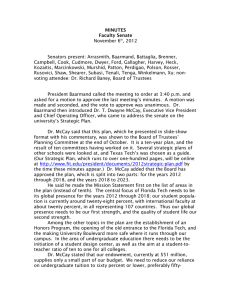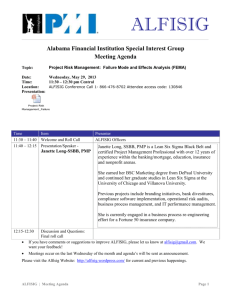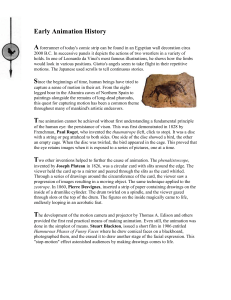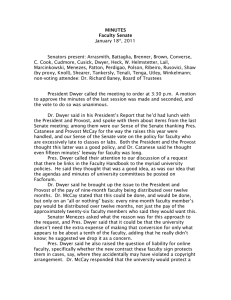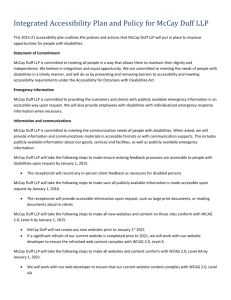April 2011 Minutes (#78)
advertisement
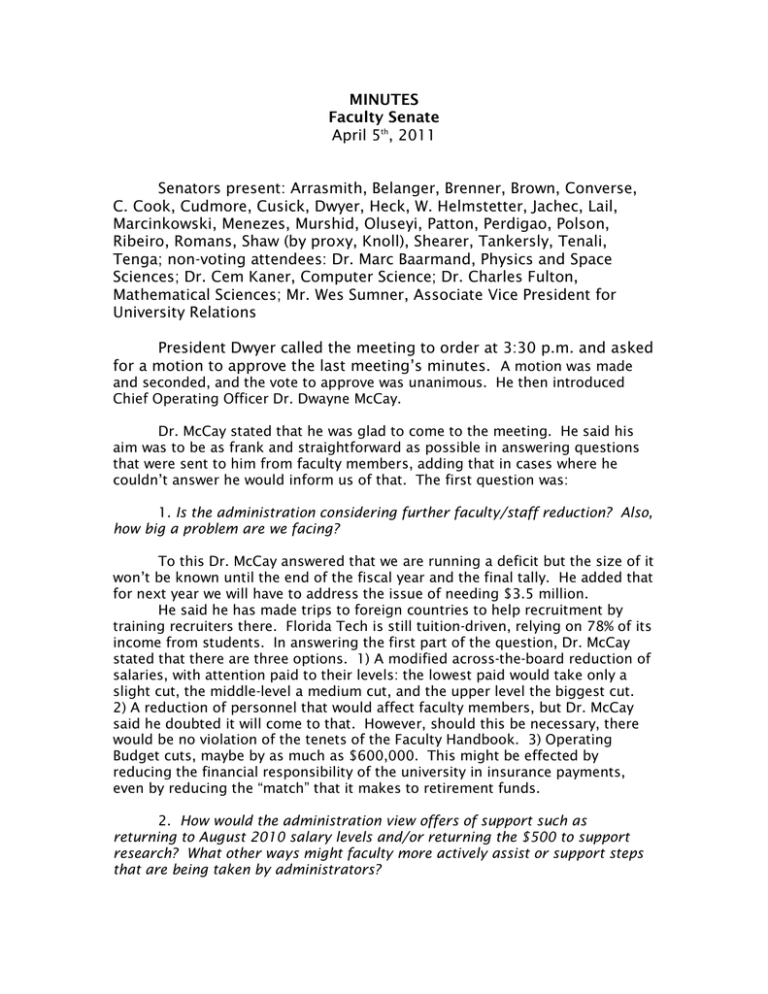
MINUTES Faculty Senate April 5th, 2011 Senators present: Arrasmith, Belanger, Brenner, Brown, Converse, C. Cook, Cudmore, Cusick, Dwyer, Heck, W. Helmstetter, Jachec, Lail, Marcinkowski, Menezes, Murshid, Oluseyi, Patton, Perdigao, Polson, Ribeiro, Romans, Shaw (by proxy, Knoll), Shearer, Tankersly, Tenali, Tenga; non-voting attendees: Dr. Marc Baarmand, Physics and Space Sciences; Dr. Cem Kaner, Computer Science; Dr. Charles Fulton, Mathematical Sciences; Mr. Wes Sumner, Associate Vice President for University Relations President Dwyer called the meeting to order at 3:30 p.m. and asked for a motion to approve the last meeting’s minutes. A motion was made and seconded, and the vote to approve was unanimous. He then introduced Chief Operating Officer Dr. Dwayne McCay. Dr. McCay stated that he was glad to come to the meeting. He said his aim was to be as frank and straightforward as possible in answering questions that were sent to him from faculty members, adding that in cases where he couldn’t answer he would inform us of that. The first question was: 1. Is the administration considering further faculty/staff reduction? Also, how big a problem are we facing? To this Dr. McCay answered that we are running a deficit but the size of it won’t be known until the end of the fiscal year and the final tally. He added that for next year we will have to address the issue of needing $3.5 million. He said he has made trips to foreign countries to help recruitment by training recruiters there. Florida Tech is still tuition-driven, relying on 78% of its income from students. In answering the first part of the question, Dr. McCay stated that there are three options. 1) A modified across-the-board reduction of salaries, with attention paid to their levels: the lowest paid would take only a slight cut, the middle-level a medium cut, and the upper level the biggest cut. 2) A reduction of personnel that would affect faculty members, but Dr. McCay said he doubted it will come to that. However, should this be necessary, there would be no violation of the tenets of the Faculty Handbook. 3) Operating Budget cuts, maybe by as much as $600,000. This might be effected by reducing the financial responsibility of the university in insurance payments, even by reducing the “match” that it makes to retirement funds. 2. How would the administration view offers of support such as returning to August 2010 salary levels and/or returning the $500 to support research? What other ways might faculty more actively assist or support steps that are being taken by administrators? Dr. McCay mentioned the three methods above, which include salary reductions. But he said that returning the $500 faculty research/improvement stipend would certainly help. And, of course, no unaffordable raises should be given. Here is how we got into the deficit situation, he said: 1) The university used borrowed funds and gifts, with no money allotted from operational funds. And there were the gifts of the Olin buildings, but without accompanying funds to maintain those buildings. Originally, Olin had said it would provide additional funds but changed its mind, leaving us holding the vacuum cleaner bag, as it were. And these buildings are hugely expensive to maintain. No operating funds are currently available for maintaining the buildings that were built in the last few years. 2) Enrollment has steadily dropped over the last three years. 3) The bad economy has caught up with us: the fact of parents having lost jobs certainly keeps them from sending their children to a school like Florida Tech. However, he added, the online program has been a tremendous financial success for us. 3. How many faculty are being non-renewed for the coming year, and what was the procedure/time-line for notification of non-renewal? Dr. McCay said that 40% of faculty contracts come up for renewal; this time that meant about eighty faculty members were considered. He said the task was to keep the most valuable members of the faculty while letting the others go. Six of the eighty were non-renewed, and he added that this was just part of the natural process. Everything was done in accordance with the Faculty Handbook. 4. Does the administration consider it feasible to reserve the north end of the Olin Engineering parking lot solely for faculty and staff? Dr. McCay said this is being considered by the administration. Out of the 277 parking spaces in the new parking garage only 100 are being used. This provides an opportunity. 5. Do you have any recommendations concerning changes to the Faculty Load Form? This is a form that Dr. McCay said he hated, and has wanted the Deans to simplify. When he was a department head there were five components to that form. One was a faculty member’s involvement in research, another the advising of graduate students, and a third one the faculty member’s teaching load, with three teaching units adding in to make up the five categories. Senator Brenner asked if the forms should be looked at as primarily evaluational or as merely informational. Dr. McCay said he considers their being taken as evaluational better. Dr. Baarmand asked what Dr. McCay expected with regard to the forms, and he replied that he wasn’t expecting anything: the forms are way overworked, he said, and all he cares about is to know if a faculty member is fully employed. 2 Sen. Menezes wanted to know if a department should have specific goals. Dr. McCay responded that he liked to let the departments function without his being involved. Pres. Dwyer: If there is too light a load isn’t that the fault of the department head? And if so, the Faculty Load Form shouldn’t be necessary. Dr. McCay: I agree, but the Faculty Load Form also lets us make sure no faculty member is being mistreated. Dr. Kaner suggested that it is up to the individual faculty member to keep busy. Each of us should take responsibility for serving the university. Sen. Marcinkowski pointed up the situation with funded research where someone is not the P.I. (principle investigator) or even the Co-P.I., but still serves as an evaluator for the research/project. Dr. McCay said that these faculty members should be paid for their services, and by virtue of that, their contribution to sponsored research would be recognized and count. Sen. Helmstetter asked if there is a current Strategic Plan. It was noted that the last one was formulated in 2009. Dr. McCay said that in May of this year a meeting to plan for a revision will take place. 6. Has any criterion been decided upon for the non-renewal of contracts at the faculty level, or has the non-renewal been activated for all faculty members whose renewal came up this year? Dr. McCay said he considered this question already answered in his previous remarks. 7. What are the plans for the Link Building? Is anything concerning that building going to happen before the end of the semester? Dr. McCay responded that nothing will be done to the Link Building before the semester’s end. He added that there is mixed input about the building as to how serious the problems are, but he said it does need to be refurbished. He went on to speak of the refurbishing schedule: the first priority is the Keuper Administration Building, since this is where prospective students first experience the university. The second priority is the combination of Evans Dining Hall and Wood Hall as the Freshman Advisory Center. The third is River’s Edge in Palm Bay, recently acquired by the university; it is to be converted to classrooms and labs in which DMES (Department of Marine and Environmental Science) faculty and others will be housed, and he hopes to see it finished during the summer; a shuttle between the campus and the Palm Bay building will be initiated for the short trips of about eight to ten minutes. The Brevard Art Museum may become a priority if it becomes university property. And the last priority is a University Commons. 8. There has been some discussion indicating in a few cases that established faculty have received one-year appointments, rather than the standard three-, four-, or five-year appointments. What are the circumstances and criteria involved in making this decision for a one-year appointment? Dr. McCay answered that he goes by his interpretation of the Faculty Handbook. There are two sets of criteria: 1) marginal performance of a faculty 3 member who is certainly capable of doing better; the one-year contract gives him or her a chance to improve. If there is no improvement then he or she is non-renewed; this is necessary because the alternative is giving that faculty member a contract of three to five years. 2) The viability in terms of need of the position a faculty member holds. The one-year contract allows the need to be established; failing that, the faculty member in that position is non-renewed. Sen. Menezes asked if the planning for the new dining facility, the parking garage and the pool took place before the financial straits of the university were known. Dr. McCay responded that this was certainly the case; there was a commitment of funds for these. A gift has been made to help with the pool’s operating costs. Dr. Knoll wanted to know what the Freshman Advisory Center is. Dr. McCay said that this is a new facility to help with the retention of freshmen, with advising and counseling its main features. And it will be used for transfer students as well. Sen. Tankersly asked how faculty might help with recruitment. Dr. McCay responded that the university is revamping its recruitment techniques and that there are two important things the faculty can do. One is to engage in the phon-a-thon in which faculty members make calls to prospective students; this, he said, is much more impressive than recruiters calling. A second thing is processing graduate applications in a more timely fashion. In the past it has taken six weeks for graduate students to get a response and four-and-a-half weeks for undergraduates; now both are answered in less than two weeks. Dr. Baarmand noted that the Graduate Office has indeed been slow, and Dr. McCay reiterated that changes have been made. Part of the problem with enrolling graduate students is that departments have taken time to decide on assistantships for their prospective students. Sen. Marcinkowski asked if distinguishing between those academic units that have few TA/GA positions to award and those that have many to award (e.g., Biology) might be looked at differently. The former allows for rolling admission while the latter may not. Dr. McCay answered that developing a bifurcated approach to these types of academic units is a good idea; however, assistantships could be awarded later, after a student has been admitted. Sen. Menezes suggested that faculty members can engage in recruitment when they are away at conferences, and Dr. McCay responded enthusiastically to that idea. This issue ended his visit to the Senate. Pres. Dwyer thanked Dr. McCay for coming to speak to us, and then moved on to the President’s Report. He said he had had lunch with Pres. Catanese and Vice President for Academic Affairs Nelson in which he discussed a contractual one-year extension for faculty, and said their views agreed with those of Chief Operating Office McCay as addressed above. Dr. Dwyer said he also discussed the university’s acquisition of the Brevard Art Museum with them. Committee Reports There was no Academic Policies Committee report. Sen. Brenner, head of the Administrative Policies Committee, reported that he had postponed ending the Administrator Evaluations at the request of 4 the Executive Committee. He said his committee is in accord that the Faculty Load Form(s) need to be in line with promotions guidelines in general and within each of the Colleges specifically. There were no reports from the Faculty Excellence Committee, the Scholarship Committee, or the Welfare Committee. There was no Old Business. Sen. Polson took over the presidency as Dr. Dwyer was awarded an ovation for his conscientious work as president. The only item under New Business was the Faculty Load Forms, which had been addressed by Dr. McCay and Sen. Brenner. It was decided that the issue of Maternity Leave, which the Executive Committee had been asked to bring up, be postponed until fall, when Human Resources Director Oglesby can be invited to the meeting. Pres. Polson asked for and got a motion to adjourn, and the meeting ended at 4:44 p.m. Respectfully submitted Bob Shearer, Secretary 5
